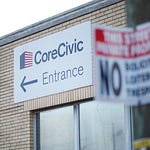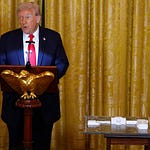Cam here 👋 bringing you your daily dose of what people are doing – good, bad, and otherwise – in the world of politics. But before I jump into it, a little programming note: Below the Belt(way) is transitioning to a weekly newsletter. This will give me more time to investigate leads, conduct interviews, and develop reporting for different social platforms.
My reporting will still be published throughout the week — on Substack, as well as on COURIER’s TikTok, Instagram, and YouTube channels — but you’ll only see me in your inbox on Fridays. That newsletter will include all of my reporting from the week, which you can also find throughout the week on the platforms linked in the previous sentence.
And remember, you can also keep up with me over on TikTok and Bluesky.
Since day one of Trump’s political career, people have desperately attempted to normalize his absurd abuses of power and blatant corruption – and 10 years later, much of corporate media remains a victim of their own attempts to return to a sense of normalcy.
It’s time to stop sane-washing the insanity.
What Happened
The Trump administration plans to deploy the National Guard to Memphis this week, making it the third city with an active military presence targeted towards civilians since June.
Despite President Donald Trump’s insistence that the Guard will actively assist local police efforts to “reduce crime in Memphis,” troops in Memphis are expected to do very little once they arrive, similar to what we’ve seen in Los Angeles and Washington, DC.
The Guard stationed in Washington, DC, has been ordered to do nothing other than “create a presence,” and participate in the occasional community service work, according to a source within the city council’s office. FBI Director Kash Patel confirmed that directive on Wednesday during a US House Judiciary Committee hearing.
“They’re going to establish — like they did in Washington, DC — perimeters, where local law enforcement and the FBI, DEA, ATF, and US Marshals can go,” Patel said. “They established perimeters. It was a visible force, sir, so they [criminals] kind of saw it.”
US soldiers are prohibited from enforcing domestic laws under the Posse Comitatus Act, a restriction that was reinforced by a federal judge earlier this month. Prior to the judge’s ruling, fully armed Marines and National Guard set up traffic blockades and protective perimeters for the LAPD; now, soldiers are “just standing around” to create informal perimeters meant to intimidate the citizenry into obedience.
The deployment of troops into peaceful US cities has been labeled by the courts as a dangerous creation of a “national police force,” and parallels the military’s prepositioning strategy, where personnel and resources are placed in anticipation of future conflict.
Typically, pre-positioning soldiers domestically only happens when authoritarian leaders seek to consolidate power by force, according to US Rep. John Garamendi (D-Calif.) — precisely why US law forbids the use of the military in such a way.
“The military itself is being used for domestic policing, that is flat out contrary to law. The Posse Comitatus law says ‘no, the military is not a domestic police’ — and for good reasons,” Garamendi said. “Look at the history around the world: when the military has been used in those countries where you have a dictatorship, the military is there to enforce the will of the dictator.
Shall I say that again? In America, the military is being used to enforce the will of the president.”
Garamendi, ranking member of the Armed Services subcommittee on Readiness, said Trump’s national police force reflects his desire for control at every level, down to day-to-day life. The effort aligns with Project 2025 plans written by Trump’s acting Defense Secretary, Christopher Miller, to transform the National Guard from a reactionary body to a constant presence in daily life.
An already-deployed National Guard not only keeps the fear of a crackdown imminent, but would also allow the Trump administration to use force immediately in the event the president decides to invoke the Insurrection Act, something he’s desperately wanted to do since taking office.
“A rebuilt Army that is focused again on its core warfighting mission and empowered it with the tools, resources, and authorities it needs to accomplish that mission must be the next Administration’s highest defense priority,” the document states. “[To] transform how the National Guard is employed during extended operations short of declared war to preclude back-to-back federal and state deployments of National Guard soldiers in order to stabilize and preserve military volunteerism in our communities.”
The deployment in Memphis, like those in LA and DC, is happening despite opposition from locally elected leaders. While Tennessee Gov. Bill Lee has been working with the Trump administration to establish what’s been dubbed the “Memphis Safe Task Force,” Mayor Paul Young was left out entirely and learned that a task force was being dispatched to his city while watching the news. Young has come out against the deployment, but has no authority to stop it, so he consulted with DC leadership on ways to effectively use the National Guard for community service projects instead.
Democratic State Sen. Raumesh Akbari, who represents Memphis, said in an interview that the response from those in her district has been largely negative.
“The public, they're kind of mixed. Most folks say, no, we don't want an occupation,” Akbari said. “We might want additional resources, but that's different from walking down the street and seeing soldiers in army fatigues and with weapons. So I don't believe it's something the majority of the city wants.”
Akbari compared Trump’s deployment to the last time the president sent the National Guard to Memphis: after Dr. Martin Luther King, Jr.’s assassination in 1968. But while mass civil unrest justified that deployment, no such unrest exists now.
Instead, Akbari sees the current use of force as an effort by the Trump administration to surveil and subdue voters who elected Democratic leaders. The flimsy excuse of targeting areas with “high crime rates” falls apart, Akbari pointed out, when the targeted areas are only those run by Democrats, while Republican-run cities with similar crime rates are left alone.
“That's the scary part, that these National Guardsmen and women are not law enforcement. So they're not going to be doing traffic stops, are not going to issue warrants. They cannot aid in that way. And so really, it's just the optics of having this military quasi military occupation,” Akbari said. “It is an interesting experiment, of sorts, to station troops in ‘blue’ cities.”
Trump plans to continue stationing troops where his political opposition lives, including Baltimore, Boston, New Orleans, and other cities in California. He attempted to send the Guard to Chicago in August, but backed down at the slightest sign of opposition from Mayor Brandon Johnson and Illinois Gov. JB Pritzker.
Republican governors, in contrast, have been eager to expand Trump’s military presence and foster an aggressive federal presence in their states. An analysis by Newsweek reporter Jesus Mesa confirmed that governors of six states have deployed their National Guard to act as personal bodyguards for ICE agents conducting immigration raids, three more have planned deployments, and 11 others have been authorized to use the Guard, but have not yet announced plans to do so.
Attempts to Sanewash
Trump is deploying the National Guard to Memphis. Experts worry it’s becoming normal
What are Trump's approval ratings in Tennessee as the National Guard plans move into Memphis?
DPS says they are prepared to assist National Guard in Memphis
Far-Right Spin
Trump Mobilizes National Guard in Memphis, Declares Crime “Dire”
Trump Targets Memphis Crime With Strategy Proven In Washington, D.C.
It’s easy for individual members of Congress to get overlooked by national outlets as they quietly skate to reelection again, and again, and again. The following is an overview of different congressional representatives you may not have heard of, with fun facts about their origin stories they’ve tried to keep out of the public narrative.
US Rep. Bruce Westerman, Arkansas’ 4th District
Since taking office in 2015, Rep. Bruce Westerman has:
Seen his net worth increase from $468,000 to an estimated $1.8 million
Sponsored 88 bills
Authored four bills that have been signed into law: to rename two post offices, to permit the sale of federal public land to an Arkansas church, and the EXPLORE Act, which aims to make national parks more accessible
Voted to pass a budget that would sell thousands of acres of public land, undercutting 25% of his legislative accomplishments
Tried to ban same-sex marriage at the federal level
Used a display Civil War sword to defend himself while hiding in the bathroom during Jan. 6th Attack on the US Capitol
Fun Facts
While Westerman has maintained an investment portfolio during his time in public service, he never really played the stock market until this year. He reported purchasing up to $1.6 million in stock across about 100 different companies. Included in the shopping spree, which amounts to over 88% of Westerman’s reported net worth, are shares in Shell, BP, Exxon, and a number of other oil and gas companies.
The purchase was made before Westerman used his position as Chair of the House Natural Resources Committee to advance a Republican budget amendment that would allow for the sale of public lands. Oil and gas companies—many of which Westerman is now a stockholder of—have long sought to purchase public lands so they can extract natural resources.
When confronted about his massive stock purchase by Democratic Rep. Yassamin Ansari, Westerman deflected, claiming that his financial advisor made the purchase without his knowledge. The alleged advice would seem to go against any financial advisor’s fiduciary duty—unless they had some sort of inside knowledge that would allow them to confidently take almost all of their clients’ personal wealth and throw it in the stock market all at once.
Attacks on free speech started in the classroom
Corporatism is when a society puts corporate interests above all else — even above personal rights. The US is seeing a real-time example of this now, as the government actively violates people’s First Amendment rights by firing, threatening, and harassing anyone who says anything negative about Charlie Kirk, a prominent member of the modern corporatist movement.
And it’s working. People in every profession imaginable are losing their jobs due to pressure from the government over their speech. And one of the reasons this is so acceptable now, believe it or not, can be traced back to the privatization of public schools.
Randi Weingarten, president of the American Federation of Teachers, actually just wrote a book on it: Why Fascists Fear Teachers.
Corporatism is a core tenet of fascism. And part of that — of successfully training a group of people to sideline their personal freedoms for the “greater good” of corporate interests — is to cut out critical thinking by eliminating free public education, something that corporatists like Charlie Kirk, Donald Trump, and private school billionaires like Betsy DeVos have wanted for a very long time.
“I've been involved in education for a very long time. I started thinking about all of this smearing. Why are teachers getting smeared all the time? Why, instead of trying to figure out how to help strengthen public education, it's immediately, ‘let's privatize, let's get rid of it?’” Weingarten said. “Was there this long-term plan, or plot, to actually try to undermine knowledge and public education as we know it by creating this kind of tremendous distrust in education? And the answer is: heck yes there is.”
Eliminating public schools and privatizing education is crucial to the success of corporatism. It not only limits what people learn and who can access education, it destroys the sense of community that schools used to provide. As the bonds forged between neighbors through collective educational success weaken, it creates a void of loneliness once filled by community engagement. It’s a void the alt-right pipeline is all too eager to fill.
And it’s beginning to manifest in how people vote. For the first time ever, bond override votes — a way for communities to vote for small, local tax increases to pay for public schools — are failing. People don’t see the value in paying a little more to help their local school district because their kids don’t go there; there’s no long-term vision for the sustainability of the community.
Weingarten considers the defunding of public schools as not only the end result of the “school choice” movement, but one of the main goals of its authoritarian architects.
“It's not just authoritarians of the past, but it is right now happening,” warned Weingarten. “They said they want to create this universal voucher program to basically stop public schools from being the center of community, from being that public square — the public square for democracy, the public square of learning to critically think and to read… privatization requires universal public school distrust.”
A zero-sum ideological war against free, public education isn’t mere speculation. School choice leader Chris Rufo explicitly outlined this strategy in a 2022 speech titled “Laying Siege to the Institutions.” Rufo laid out the need to create an atmosphere of disdain for public schools so pervasive it would erode public trust and steer them toward private, for-profit models.
“To get universal school choice, you really need to operate from a premise of universal public school distrust,” said Rufo. “In order for people to take significant action, they have to feel like they have something at stake. I think that public schools have done a remarkable job at doing that — specifically the public school teachers' unions.”
More and more states have shifted to “school choice” models, where parents can use tax dollars to subsidize private education for their kids. This has resulted in school closures, tax fraud, and racial and economic segregation.
Privatization could quickly expand nationwide, thanks to an opt-in, national school voucher program tucked into the federal budget. Should states choose to use it, the federal voucher program would siphon up to $50 billion in taxpayer funds away from public schools, decimating local education systems and denying millions of children access to education.
Advertise in this newsletter
Do you or your company want to support COURIER’s mission and showcase your products or services to an aligned audience of 190,000+ subscribers at the same time? Contact advertising@couriernewsroom.com for more information.















